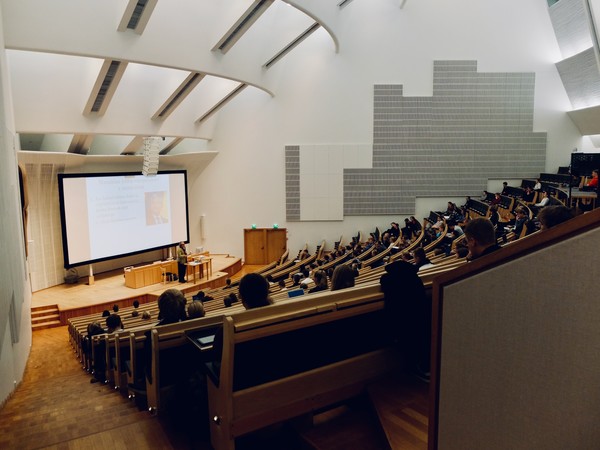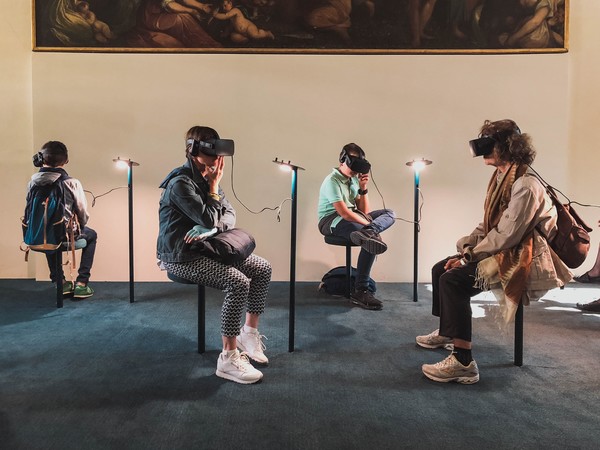A virtual campus on UVERSE provided by LG Uplus
THE FIELD of education has witnessed significant technological advancements, and Yonsei University is now embracing the latest trend by collaborating with UVERSE. Within this digital environment, students will be able to attend lectures, interact with peers, and participate in various activities. By incorporating technology in education, the university aims to prepare students for a technology-driven future where virtual collaboration and digital proficiency are becoming increasingly crucial.

What the UVERSE is
UVERSE is a metaverse platform for university campuses developed by LG Uplus Corp. The name, UVERSE, is a combination of the word “you,” for the users, and the suffix “-verse,” from “metaverse[1].” As the name suggests, this platform will provide a realistic and immersive campus experience, offering a blend of educational content and interactive features. Five universities, including Sookmyung Women's University and Soonchunhyang University, have already opened virtual campuses on UVERSE, and Yonsei University is next in line. In an interview with The Yonsei Annals, Park Taeyoung (Prof., Dept. of Applied Statistics), chairman of Yonsei’s Virtual Campus Program (VCP) promotion committee, commented that the virtual campus is expected to launch in January, 2024. Meanwhile, a beta version will be tested by the Yonsei Campus Harmony Supporters[2] from Oct. 27, 2023.
For Yonsei University’s virtual campus, representative buildings of Sinchon campus, such as Underwood Hall, the Central Library, and the Amphitheater, have been replicated through 3D modeling. Yonsei students will be able to customize personal avatars and roam around this virtual space. In the UVERSE auditorium and lecture rooms, lecturer avatars will be able to conduct lectures on stage while sharing documents and videos. Participant avatars can join as an audience and ask questions through text messages. The virtual library will have a video conference function where students can prepare group projects, study with friends, or study alone while listening to white noise for greater focus. Moreover, the Amphitheater in UVERSE will be able to accommodate up to 1,000 users and is expected to arrange large-scale virtual events, such as AKARAKA and the joint cheering event with Korea University.
Students will be able to easily access the virtual campus through both UVERSE and Yonsei University’s official webpage without needing any additional installations. It will be a safe environment as users will have to certify their status as Yonsei students or faculty using their Yonsei email addresses when signing up. Guests, such as alumni and prospective students, will be invited to limited spaces on the virtual campus.

Why UVERSE?
Yonsei’s virtual campus will bring forth a host of advantages that enhance the overall educational experience for students. Interactive features, such as customizable avatars and text messages, challenge passive learning by instilling a sense of personalization and enjoyment. Park explained that UVERSE will integrate a unique system called the "Game Quest Curriculum Roadmap." This system gamifies education, allowing students to earn points through class participation. Accumulated points can be used to decorate avatars and purchase, for instance, a Yonsei varsity jacket for them to wear. Such features will motivate students to actively participate in shaping their own learning journey.
Beyond enriching their learning experience, the virtual campus will also address the necessity of accessibility and inclusivity in higher education. By breaking down geographical barriers, the virtual campus will expand the university's reach and attract students from diverse regions. The metaverse will also offer students access to online anonymous counseling sessions, providing a safe and secure support system. Notably, UVERSE offers unlimited spaces for club rooms, events, and exhibitions. Every student club will be able to acquire their own club room in the virtual campus without authorization, which is otherwise needed on a physical campus. If more clubs are able to provide their members with exclusive spaces, students’ sense of belonging and community engagement will be further enhanced.
To understand what features in UVERSE would appeal to students, the Annals interviewed Bang So-youn (Sr., Dept. of Human Environ. & Design and Dept. of Theology). Bang had hosted a graduation exhibition on a physical campus, where she and her teammate invested approximately ₩1.3 million for the preparation and final display. She hopes that hosting an exhibition on UVERSE will be able to reduce these expenses and financial burdens on students, hence enabling more students to hold events and exhibitions. However, she also expressed concerns regarding the delivery of her creative intentions. Hearing and olfactory elements are as important as visual elements in an exhibition. With one or two elements missing in a virtual space, she questions whether her message could be conveyed accurately to the audience. She commented that for students to actively use UVERSE, the vivid and elaborate embodiment of the physical campus is essential.
Though the lack of physical presence in a virtual campus may be a concern, UVERSE will prepare its students for the future trends and demands of a rapidly evolving digital landscape. Digital fluency, an essential skill in an increasingly technology-driven world, will become ingrained in students' skillsets as they navigate virtual spaces and utilize digital tools. These experiences will nurture adaptability and problem-solving capabilities, empowering students to thrive in diverse and dynamic professional environments.
Embracing the future of education
In addition to UVERSE, other international virtual campuses are on the rise. The Hong Kong University of Science and Technology (HKUST) was the first university in the world to establish a metaverse campus[3]. Harvard University is developing a virtual campus—the “Virtual Harvard[4]”—accessible to students using their computers, smartphones, and Augmented Reality (AR) and Virtual Reality (VR) glasses. Stanford University and the University of Tokyo are also notable institutes that have campuses and classes in virtual settings[5]. These leading universities have committed to creating virtual campuses as it represents a transformative step towards the future of education. They are paving the way for a more interconnected, accessible, and dynamic learning environment.
Park expressed his enthusiasm for Yonsei’s virtual campus, commenting that UVERSE—along with Yonsei University’s educational platform LearnUS—will best serve the role of the education platform a university needs. Jeon Seung-hoon, head of the smart infrastructure business department at LG Uplus, expressed that it is an honor to build a metaverse platform with Yonsei University, a representative university of Korea. He hopes to expand the education paradigm in collaboration with Yonsei University[6].
Embracing a virtual campus showcases Yonsei's commitment to staying at the forefront of educational innovation and adaptability. Through the creation of a virtual campus with UVERSE, Yonsei University aims to inspire innovation, collaboration, and excellence in the realm of higher education.
[1]UVERSE
[2] Yonsei Campus Harmony Supporters: Helpers at the Global One-Stop Service Center (GOSC) of Yonsei University’s Office of International Affairs
[3] The Hong Kong University of Science and Technology
[4] The Harvard Crimson
[5] “Metaverse for education—Virtual or real?”
[6] LG

